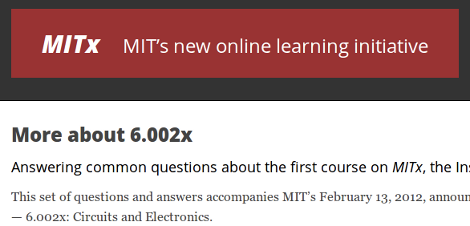The Massachusetts Institute of Technology just announced the first course offering in their new online classes program. Great news, it’s an analog design course which is right up our alley. The prototype session will be 6.002: Circuits and Electronics.
If you’re a fan of our links posts you may remember hearing about the MITx program a month ago. After seeing the popularity of the Stanford program MIT is throwing their hat into the ring too. So what is this all about? How does it work and what will you learn? There’s bits of information all over the place. We recommend reading the news link at the top of this feature first. Next you should wade through the 6.002x FAQ and if you’re still interested there’s a big maroon enrollment button at the bottom of the course summary page.
Whew, that’s a lot of links. Anyway, expect to spend 10 hours a week on the class; but it’s all free. Future offerings will be free as well, but MIT plans transition to a pay-for-certificate option: “students who complete the mastery requirement on MITx will be able to receive the credential for a modest fee.” If you still haven’t made up your mind take a gander at the promo clip after the jump.
[youtube=http://www.youtube.com/watch?v=p2Q6BrNhdh8&w=470]
[Thanks War_Spigot and Stuart]
















“In order to succeed in this course, you must have taken an AP level physics course in electricity and magnetism.”
Just FYI.
yup, count me out. I was totally psyched until I saw the requirements.
Do it anyway. I’m fourteen, haven’t taken physics(or calculus, which is another “requirement”) but since since its only a few hours a week doing stuff related to what I’d probably be doing anyway, I went ahead and enrolled. Can’t hurt, it’s free.
@War_Spigot
Fourteen, and you haven’t taken Calc what’s that like 9th grade. I slacked in 6th and 7th grade but once you hit 8th you prep and 9th you better be ready because it starts counting I’m in 11th grade currently I’m 16 so I recomend putting out your A game.
@War_Spigot
Not to put you down but I doubt you will understand any of this, and trust me 9th grade stuff is NOTHING compared to college material. But again it is your time, I hope you can get something accomplished.
It is okay. That is what calculators are for. No advanced math should be necessary. Most are plug in formulas. I always dislike it when adults try to strengthen their hold on others through the use of obfuscating BS. Go for it. Can’t hurt either way. There are also numerous pdfs online of their previous course works and tutorials in electronics that are handy, but get “heady” real fast. An example: went for a simple RC LPF knee formula and ended up in PLL based LPF for satellite transmission signal cleanup. It is all interesting reading and makes me wish I had actually studied this stuff in school, but in the age of goog/wiki you can fill in the blanks. As Mitch Hedberg jokes “Any book is a kid’s book if the kid can read” nyuk nyuk nyuk. Stay at it warspigot :)
signed up, looked for the first video… oh it doesn’t start till march… damn…
Stoked, this looks great. Signed up.
If you would like to see what the course looked like a few years ago…..here are some links:
Academic Earth
http://academicearth.org/lectures/introduction-and-lumped-abstraction
and
MIT Open CorseWare:
http://dspace.mit.edu/bitstream/handle/1721.1/45532/6-002Fall-2000/OcwWeb/Electrical-Engineering-and-Computer-Science/6-002Circuits-and-ElectronicsFall2000/VideoLectures/index.htm
The Book they are using for the course is:
http://www.amazon.com/exec/obidos/ASIN/1558607358/ref=nosim
Enjoy the knowledge…I guessing they are updating the class videos….we will get change to see.
Enjoy everyone
So it’s an automated classroom? free of charge?
seems to be, though there’s some talk of a nominal charge to get credit for it, in the future, but it will always be free to audit, more or less.
In the future, if you do well, you can pay to get the certificate. Since this is a “prototype” they’re waiving all the fees.
Sounds like a great program. Just signed up myself.
Heck, even if you don’t have the physics education they put as a prereq, and even if you don’t pass the tests, you’ll probably learn something useful.
I took a look at the textbook that the course will be using and if you just casually page through even chapter 1 (I spent about 15 minutes looking through it), you’ll be amazed at how overly-complicated the material looks for an introductory book to fundamental concepts in EE. Way too heavy on the emphasis to turn everything into formulas. Much past understanding Ohm’s law, and how to calculate power, the rest of the chapter 1 text should be more about practical applications and less about “theory”.
bool isWorthAttending = course == “MITx” ? false : true;
That’s the difference between university courses and hobbyists. You can do a lot of cool stuff without the background theory, but if want to dig into the formulas and a deeper understanding beyond Ohm’s law, it will take some good math skills and/or hard work.
I looked at the Table of Contents for the book and they take a very different approach to the material than I have seen as typical to university courses. Generally, a course of study would go deeply through electrical networks with passives and op amps first, then get into active devices in a follow-on course. This course mixes it all together. Would have to see how that works out.
Interesting, because that’s not what I saw with Amazon gave me to review from the book. There where examples described as being the “hard way”, Formulas/methods I never seen before, so I assume that’s what’s taught in basic raw physics to go about it. Those where reduced down to give Ohms law, and other formulas most are familiar with.
By the time spring rolls around, I’ll have finished my linear algebra and E&M physics prereqs at another university. What luck!
Time for a refresher in EE; sounds nice so far. Too bad the text book is $80 or I’d order it right away.
its not necessary and you could just tor rent it
Enrolled. This should be a great refresher.
Thanks for the heads up, HAD.
Old lectures of 6.002 can be watched on YouTube if you want to know what your getting into.
Can also be found here
http://ocw.mit.edu/courses/electrical-engineering-and-computer-science/6-002-circuits-and-electronics-spring-2007/
I just want to say you all that the guy with this course is AMAZING!
seems like a good way to sell books
F. Yes. Enrolled. The internet can teach you how to do Algebra, Calculus, and differential equations at the same time. Sign up anyway. If it’s free, it’s for me.
Definitely, and here’s where I’ll be starting to brush up on the Calculus, Linear Algebra, and Differential Equations:
http://tutorial.math.lamar.edu/
Anyone have a tried and true resource for the Physics (“electricity and magnetism”) aspect?
I have http://lightandmatter.com/ bookmarked, but I’m not sure if it will be sufficient.
As an EE grad, it is painful and overcomplicated doing a course like this. You probably won’t even get to do anything tangible – it’ll all be on paper.
You don’t need to know half the math if you want to do electronics. In fact 90%+ of the subject matter is irrelevant. If you are a full time electronics engineer yes, but if you use it as a tool or a hobby, probably not.
Grab a copy of “The Art Of Electronics Student Manual”, an old scope, power supply and function generator (you should be able to source all these for not much more than the MITx reading material for this course). This will give you want a good, thorough end to end tutorial on electronics which gives you a better logical understanding of what is going on. The only math background required is arithmetic and basic algebra.
Only going on the course description I agree with your advice. I taught myself electronics back in middle school using those Forrest Mims books from radioshack – great stuff. http://www.forrestmims.com/
I then moved on to The Art of Electronics, which gave me a better understanding of analog stuff, as well as a new perspective on filters and such. I’ve since got a master’s degree in applied math so the diff eq stuff all makes sense to me and it’s easy to think in those terms, but you really don’t need it to just tinker around with electronics.
And if you’re mostly interested in arduino and digital stuff, hell just read a good book on microprocessors. You need very little electronic theory or math to put together a working microcontroller project.
So start with the Forrest Mims book Getting Started in Electronics, check out The Art of Electronics when you’re ready, and also find a book you like about microprocessors. If it doesn’t include assembly language basics, that’s a good subject to look into as well.
What the hell, I’ll enroll. I’m sure it will refresh what I learned in the Electricity/Electronics class at NWKSVTS in the mid ’70s, along with learning something new. I know enough about the topic to expect it will be work to get anything out of it, enjoyable work, but an effort all the same. The textbook price is a killer,fortunately it’s not required, but I like to be able to retain textbooks in my personal library of physical books.
An additional comment, to the other comments to this article. Great to be reading comments that provide links to useful information relative to the topic matter. Thank you to those did.
If knowledge is your drug (too), then http://theassayer.org/ is your dealer.
Meh, should have included the following:
“The Assayer is the web’s largest catalog of books whose authors have made them available for free.”
Any kind moderators out there willing to combine these replies into one?
Hello to every one.wishing you good luck
So, has anyone who has registered been contacted by mit.edu by email or some other means? I find it hard to believe there isn’t even a mit web site that has gone live for this “first prototype course”. The class does start tomorrow doesn’t it?
Wow Lovely thanks you all (I presume most of you are in the developed world) for all the bits a pieces of infor such great help. It will go a long way towards helping some of us here in the less developed world. Really seeking to become an EE one day
I enrolled the course and finishing it with an online exam this week. I strongly recommend any hobbyist to take the opportunity of those online courses (by MITx or any other) since things are going to be explained(!) there and proved with the help of math. The quality of 6.002x is just awesome and yes, it requires a full commitment with some 10-15h a week – very true for me anyway.
I agree – you’ll probably never need to solve 2nd order diff. equations on your own later on but without any decent help I think it would be rather hard to understand how LCR combinations “work”, how filters are designed with the help of energy storage devices like inductors and caps and/or op. amps and caps, how to analyze circuits in time domain and frequency domain etc. I personally think that prof. Anant Agarwal is a real pioneer in online teaching field and will be recognized world-wide any time soon. It’s just so well put together.
—
I’ve been fiddling with some simple MCU projects about 2 years now and felt recently a decent “hunger” for knowledge like this since I hit kind of a barrier – my ideas were becoming just too-much-more complex than I could handle with my limited knowledge in EE.